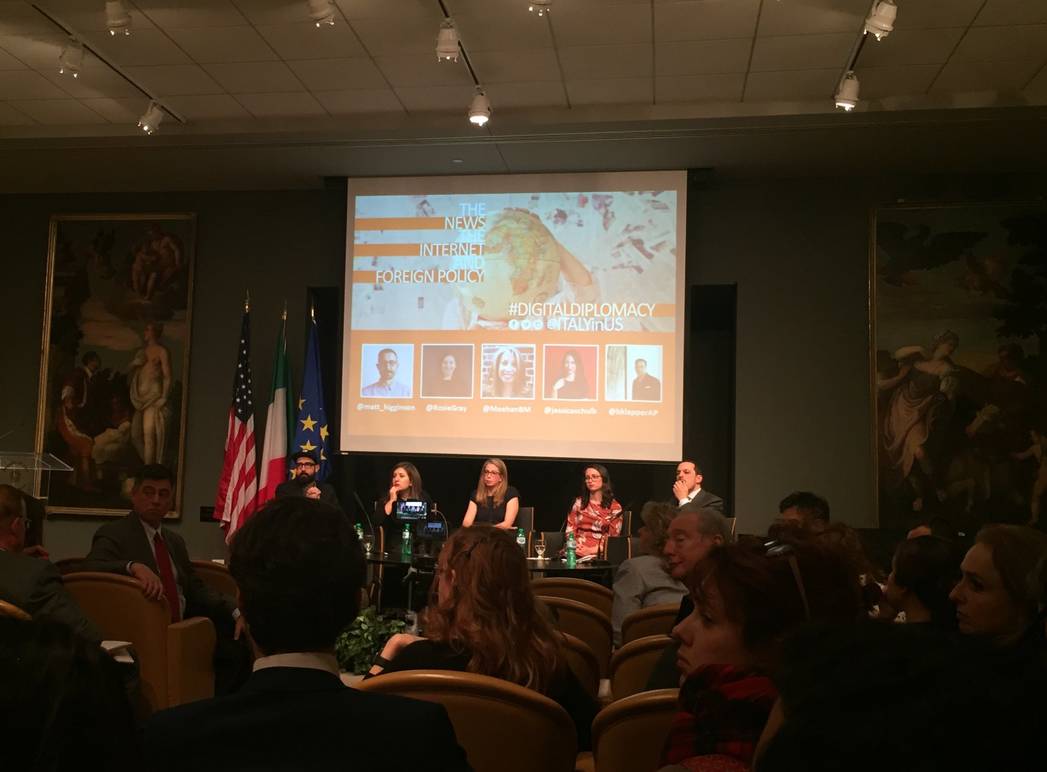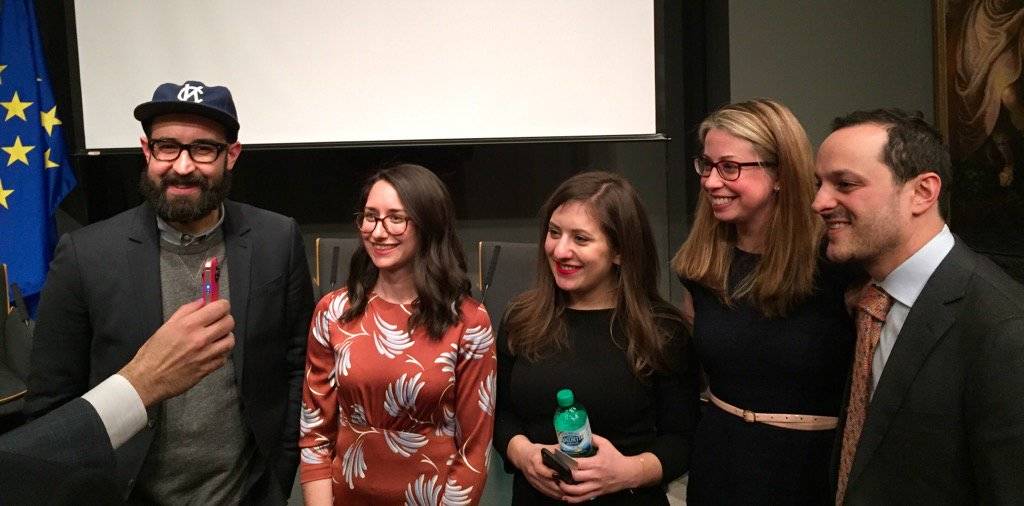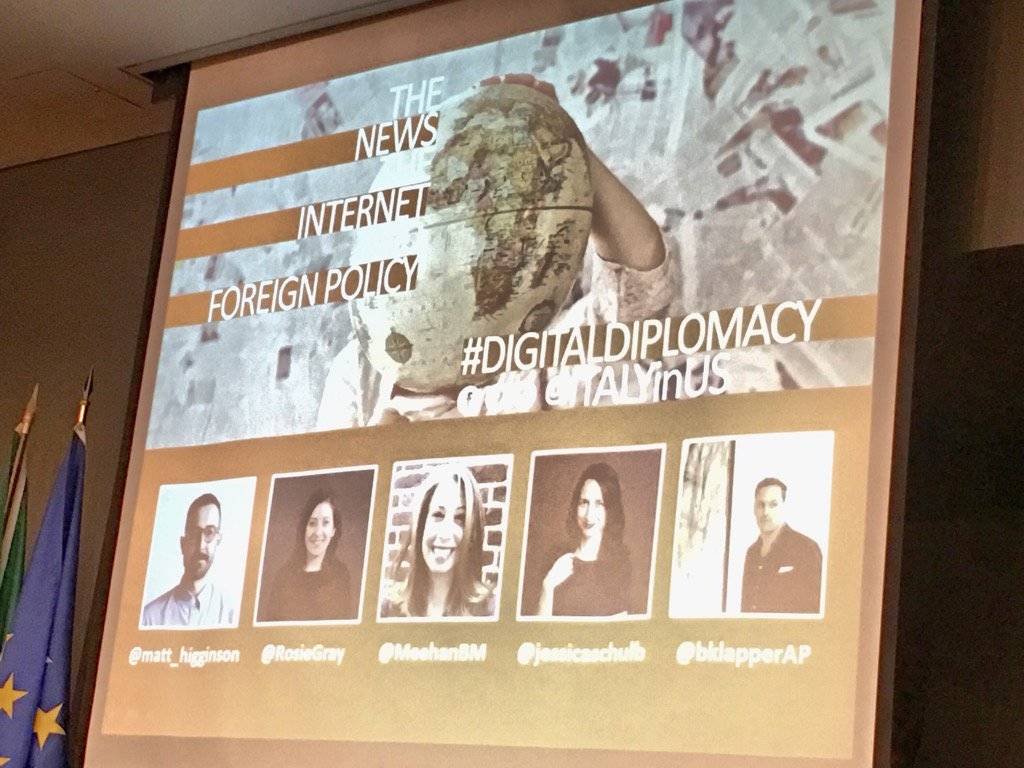Digital Diplomacy Series: Journalism in Modern Day America
The Digital Diplomacy Series began in 2012 as a way to explore and examine the use of social media platforms by the foreign policy community for topics such as internet freedom, internet rights, and the future of innovation. Recently the reliability of news sources has been an ever increasing problem which is why the Embassy chose to focus particularly on the intersection between news and the internet at this conference. The panelists delved into questions like how foreign policy falls into mainstream and online media as well as what impact the “fake news” phenomenon has, if any, on the realm of foreign policy.
Meet the Panel
Moderator Bernadette Meehan, who currently works as a spokesperson for the United States National Security Council, was joined by brilliant guests including Matt Higginson, head of politics and government affairs at Medium; Rosie Gray, reporter of U.S. politics and global affairs for The Atlantic; Bradley Klapper, acting national security editor for The Associated Press; and Jessica Schulberg, foreign affairs reporter at The Huffington Post. Together they discussed what it means to be living in a digital world and all the struggles that come with it.
The Power of Social Media
Just within the last ten years, social media has taken the world by storm. With the influence of Twitter, Instagram, and Facebook growing more and more every day, it is evident that this unchartered territory has started to have a huge effect on politics and foreign affairs. For example, it has given any person with a smartphone the ability to directly upload videos live as they’re happening which presents just as many challenges as it does opportunities. Bradley Klapper put it best when he said that “social media has completely changed the landscape for media.”
The government used to be the primary source for news gathering which means the news we received had always been already filtered. Given the newfound immediacy of social media, Higginson said “the world is getting closer, news is getting faster and the traditional way of reporting doesn’t seem as relevant sometimes.” However, this great democratization of information has led us to a point of content overload where disinformation is spread way too easily and the hyper-polarization of online news is dangerous. Unfortunately, it seems that our news no longer serves to inform but rather to entertain.
Fake News and Politics
News agencies that aim to entertain are why reporting has grown into an intense competition between putting out an accurate and complete story that takes longer to formulate versus being the first person to announce breaking news even if not all the details are in yet. Schulberg argued that this issue can be a good thing because it forces reporters to think creatively. She added “if you aren’t the first then you better have something better to offer when you come in second whether that’s a new tidbit of information on the story that someone else missed because they were rushing or perhaps an unexpected angle.”
When governments in particular engage in disseminating fake news, it is important to keep in mind that the responsibility of the journalist in this situation remains the same. Klapper said governments have always been inherently skewed and the journalist’s duty has always been to “talk to as many people as possible, lock down information as hard as you can, avoid the single sourcing at all costs because that’s where we see people get in trouble. In that sense, this is why traditional journalism has its value.”
The Bottom Line
Even though the world seems to be changing a lot and very quickly, every government that has ever existed is guilty of giving its citizens misinformation in a subtle or not so subtle manner. It is up to journalists to do their job correctly and not give into the pressures to create a hot take on a story or to report on things that haven’t been factchecked yet. As for the everyday citizen, our job is to be extremely vigilant and critical of our sources and to not believe every single thing that pops up on our Facebook feed. Even though social media is fun to have, it is only an excellent resource when used in an appropriate way.
For those who are interested in the Digital Diplomacy Series, the project will continue throughout the year and more information can be found at: http://www.twiplomacy.it/






































i-Italy
Facebook
Google+
This work may not be reproduced, in whole or in part, without prior written permission.
Questo lavoro non può essere riprodotto, in tutto o in parte, senza permesso scritto.